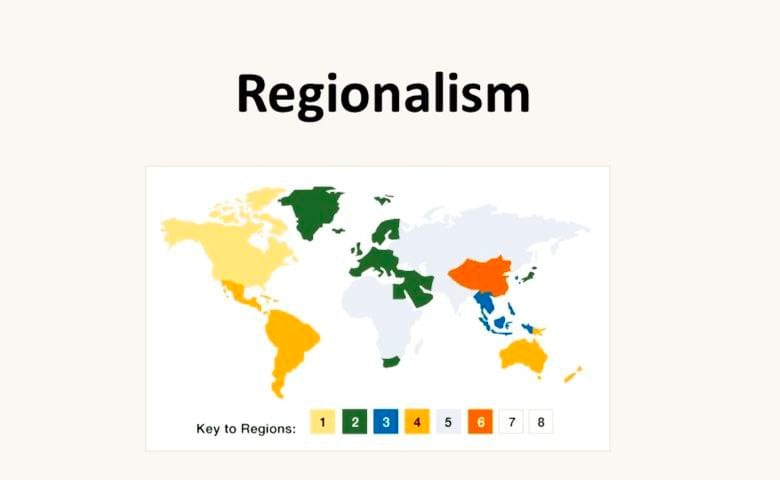Meaning of Regionalism
Regionalism refers to the strong identification and allegiance to a particular geographic area or region, often at the expense of national unity. It is rooted in the distinct cultural, linguistic, economic, or historical characteristics of a region. Regionalism can manifest in the form of demands for political autonomy, economic development, preservation of regional identity, or even secession from a larger national entity. It can be a response to perceived neglect or imbalance in development, resource distribution, or governance.
While regionalism can be a positive force in advocating for regional development and the protection of local cultures, it can also create tensions and conflicts between the region and the central government, sometimes threatening national integration.

Causes of Regionalism
Regionalism arises due to a combination of social, economic, political, and cultural factors. Key causes include:
- Economic Disparities:
- Uneven economic development among different regions creates feelings of neglect and discrimination. Regions that lag behind in industrialization, infrastructure, and employment opportunities may seek greater control over their resources and development.
- Cultural and Linguistic Identity:
- Regions with distinct languages, cultures, or religions may feel alienated by the dominance of a majority culture or national identity. This sense of marginalization can lead to demands for greater autonomy to preserve regional traditions, languages, and ways of life.
- Historical Factors:
- Certain regions may have distinct historical experiences, such as being former princely states or colonized areas. Historical grievances can fuel a sense of regionalism, particularly if these regions feel they have been unfairly treated or exploited in the post-colonial period.
- Political Autonomy and Decentralization:
- Centralized governance can trigger regionalism if regions feel that decisions made at the national level do not address their specific needs or interests. The demand for more local autonomy or federal devolution is often seen as a remedy to perceived over-centralization.
- Neglect by Central Government:
- Regions may develop strong regionalist sentiments if they feel neglected by the central government in terms of infrastructure development, education, healthcare, and other services. This often happens when regions are far from the political and economic centers of the country.
- Ethnic and Religious Factors:
- Ethnic or religious minorities concentrated in certain regions may feel politically, culturally, or economically marginalized. This can fuel regionalism, with demands for greater rights, recognition, and representation.
- Political Mobilization and Leadership:
- Local political leaders often play a key role in stoking regionalism by mobilizing people around regional identities to gain political power. Regional parties and leaders may use regionalism as a tool to assert political dominance at the local level.
- Imposition of National Policies:
- National policies that do not consider the unique needs or conditions of specific regions may lead to resentment. For example, land acquisition laws, industrial projects, or environmental regulations imposed by the central government may clash with local interests.
- Regional Imbalances:
- Imbalances in the allocation of resources, investments, and government attention can lead to grievances in less-developed regions. Areas that feel they are being left behind in terms of economic growth and employment opportunities may develop strong regionalist tendencies.
Remedies to Regionalism
To address the challenges of regionalism and promote national unity while respecting regional diversity, the following remedies can be considered:
- Balanced Regional Development:
- The central government should ensure equitable distribution of resources and investment across all regions to reduce economic disparities. Developing underdeveloped regions through targeted economic policies, infrastructure development, and employment generation can address the root causes of regional discontent.
- Decentralization and Federalism:
- Strengthening federalism by decentralizing power to state and local governments can help address regional demands for autonomy. By allowing regions to have greater control over their own governance, resources, and development, a sense of inclusivity and participation in national affairs can be fostered.
- Cultural and Linguistic Recognition:
- The state should recognize and protect the cultural, linguistic, and religious diversity of regions. This can be done through policies that promote local languages, respect traditional practices, and provide autonomy to regions to preserve their cultural heritage.
- Empowering Regional Leaders:
- Empowering regional leaders and institutions through mechanisms like autonomous councils and regional development bodies can help channel regional aspirations constructively. This can prevent regionalism from taking extreme or secessionist forms.
- Inclusive National Policies:
- National policies should be flexible enough to accommodate regional diversity and specific needs. Laws and reforms should be formulated in consultation with regional leaders to ensure that they reflect the interests and conditions of different regions.
- Promoting National Integration:
- Efforts to promote national integration through education, media, and social programs can help build a sense of belonging among people from different regions. It is important to emphasize common national values while respecting regional diversity.
- Strengthening Regional Political Representation:
- Providing adequate representation to regions in national decision-making bodies such as Parliament can address regional concerns. For instance, regions with distinct identities should have a voice in the formulation of policies that affect them directly.
- Reducing the Influence of Extremist Regionalism:
- The central and state governments should take measures to curb extremist or secessionist regional movements through dialogue, negotiation, and inclusive policies. At the same time, law enforcement should act against those using violence or illegal means to further their regionalist agenda.
- Promoting Inter-regional Cooperation:
- Encouraging inter-regional cooperation on economic, social, and environmental issues can foster mutual dependence and understanding among different regions. Initiatives like regional development councils can address shared concerns and promote development collectively.
- Strengthening Local Governance:
- Effective local governance systems, such as Panchayati Raj institutions and urban local bodies, can address local grievances more directly and reduce dependence on the central government. Local leaders who understand the region’s unique challenges can effectively address issues that might otherwise fuel regionalism.
Conclusion
Regionalism, while rooted in genuine concerns of cultural identity and economic disparity, needs to be balanced with the broader national interest. While it can help address local issues and promote regional development, excessive regionalism can threaten national integration. Addressing the causes of regionalism through equitable development, political decentralization, and cultural recognition is essential to ensuring both regional and national harmony.

